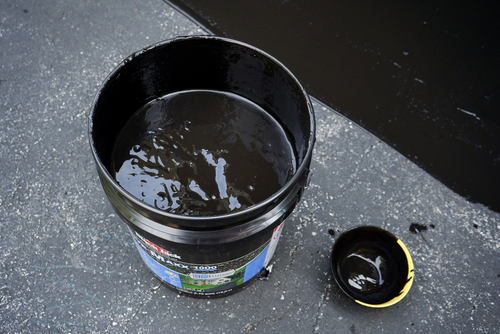Everything You Need To Know About Asphalt Sealcoating

Asphalt sealcoating is a crucial step in prolonging the life and maintaining the appearance of your asphalt surfaces. Whether you are a homeowner looking to protect your driveway or a facility manager responsible for maintaining a parking lot, understanding the benefits, application process, and timing of sealcoating is essential. In this blog, we will cover all you need to know about asphalt sealcoating to empower you to make informed decisions and ensure long-lasting and attractive asphalt surfaces.
Benefits of Asphalt Sealcoating
One of the primary benefits of sealcoating is its ability to protect the asphalt surface from various elements. Sunlight, rain, snow, and chemicals can all cause deterioration and damage to unprotected asphalt. Sealcoating acts as a barrier, preventing these elements from penetrating the surface and causing cracks or potholes. By shielding your asphalt from these damaging factors, you can significantly prolong its lifespan.
In addition to protecting the asphalt, sealcoating also enhances its appearance. A fresh coat of sealcoat gives a dark, smooth, and clean finish to the surface, making it look well-maintained and appealing. This is especially important for commercial properties where the appearance of the parking lot or pathways can significantly impact the overall impression of the business.
Application Process
Sealcoating is typically applied in thin layers using specialized equipment. Before the application, any cracks or potholes should be repaired and the surface thoroughly cleaned to ensure proper adhesion. It is important to choose high-quality sealcoat materials that are designed specifically for asphalt surfaces to ensure lasting results.
Ideally, sealcoating should be performed when the weather conditions are dry, with temperatures above 50 degrees Fahrenheit. This allows the sealcoat to cure properly, creating a strong and durable protective layer. While many homeowners and facility managers choose to hire professionals for sealcoating, it is possible to tackle the task on your own if you have the necessary equipment and knowledge.
Preservation of Asphalt Surfaces
Asphalt sealcoating plays a critical role in preserving the integrity of your pavement. When left exposed to the elements, asphalt can start to deteriorate due to oxidation, water infiltration, and freeze-thaw cycles. Cracks and potholes can form, leading to more extensive and costly repairs. However, regular sealcoating can prevent these issues from occurring or escalating, saving you money in the long run.
It is important to note that sealcoating is not a one-time fix. Rather, it is a maintenance practice that should be performed regularly to ensure optimal protection and preservation of your asphalt surfaces. The frequency of sealcoating depends on various factors such as climate, usage, and condition of the asphalt. As a general guideline, it is recommended to apply a fresh coat of sealcoat every two to three years.
Debunking Myths About Asphalt Sealcoating
There are several misconceptions surrounding asphalt sealcoating that may deter some from considering this essential maintenance practice. One common myth is that sealcoating causes the asphalt to become too slippery. While it is true that newly sealed asphalt may have a slightly smoother surface, the addition of sand to the sealcoat mixture ensures sufficient traction for vehicles and pedestrians.
Another myth is that sealcoating can be applied on any type of asphalt, regardless of its condition. In reality, sealcoating is most effective when applied to relatively newer and structurally sound surfaces. If your asphalt is severely damaged or has extensive cracks and potholes, it is recommended to address these issues before applying sealcoating for optimal results.
Finding the Best Timing for Sealcoating
Timing is crucial when it comes to sealcoating. As mentioned earlier, it is important to choose the right weather conditions for application. Additionally, it is advisable to schedule your sealcoating project during a time when there is minimal traffic on the surface. This ensures that the sealcoat has enough time to dry and set without any interference.
Planning your sealcoating project well in advance allows you to secure the necessary equipment, materials, and professional assistance if needed. By being proactive and following a regular maintenance schedule, you can avoid potential asphalt damage and costly repairs.
Summary
Asphalt sealcoating is a vital step in protecting and maintaining the condition of your asphalt surfaces. It offers numerous benefits, including protection from elements, enhancing appearance, and increasing the lifespan of your asphalt. By understanding the application process, debunking myths, and finding the best timing for sealcoating, you can make informed decisions and ensure long-lasting and attractive asphalt surfaces, whether you are a homeowner or facility manager. Remember, regular sealcoating is the key to preserving the integrity of your asphalt and saving money on future repairs.
Need a Paving Contractor in Murfreesboro, TN?
Priority Paving provides high-quality asphalt and paving services to Murfreesboro, TN and its surrounding cities. Our asphalt contractors have 38 years of experience in our industry, allowing our business to excel and provide the best paving services for our clients. We specialize in replacement, repairing, and maintenance for driveways and parking lots, with services for both residential and commercial clients. Priority Paving is looking forward to bringing our quality to your property! Call us today to schedule an appointment.
Categorised in: Asphalt Sealcoating


